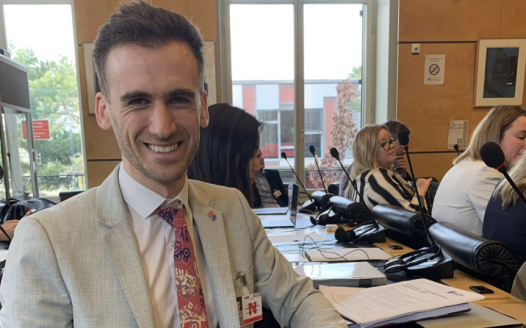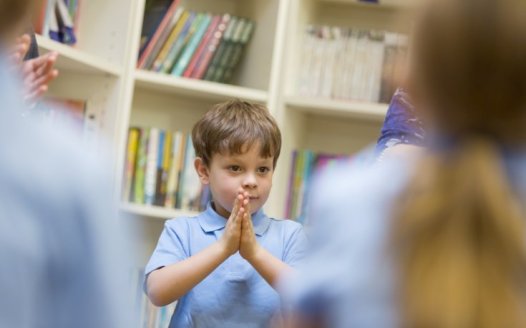A parent’s perspective: a review of the ‘collective worship’ requirement is long overdue
Posted: Fri, 25th Jul 2014 by Alison Fenwick
As a parent of a 6 year old daughter, Alison Fenwick argues that the obligation on schools to 'worship' impinges on her parental right to raise her child in accordance with her own beliefs.
I first became concerned about the status of the Christian religion in English schools when I attended my daughter's primary school assembly and saw several tapestries on the walls depicting scenes from the Bible, and when our daughter told us that sometimes in assemblies, pupils 'pray' to 'God'. As our daughter attends a community school and not a 'faith school', this came as quite a surprise.
As we have recently moved to the UK from Australia, it has been troubling to see the more overt role religion plays in the state schools here. By comparison, in Australia students have a timetabled 'scripture' class, where the parents can choose for their child to attend a range of different classes depending on their faith, or, crucially, to attend 'non-scripture' (which the majority chose in my experience). Australia has been experimenting with introducing 'Ethics' from Year 4 as an alternative to Religion in primary schools, and those trials have been very positively received. Unsurprisingly perhaps, the churches in Sydney have objected loudly to this move.
Religions know all too well that the best way to enrol new followers is to get them young. Not only are they more impressionable, but also far less likely to question an adult's authority, or have any capacity to distinguish the difference between a teacher who tells them that 2+2=4 and one who tells them that God created the world and everything in it. At a young age, most children want to conform and belong. Religions are well aware that if they make an inroad into cultural habit by making their faith an integral part of that, then they may just have snagged a believer for life.
As a result of our concerns I met with my daughter's head teacher. She assured me that the curriculum demanded that a 'multi-faith programme of study' be in place, and that children are taught about many faiths and the role that faith plays in different people's lives. She did however admit that there was sometimes praying in assembly, and assured me that she would in future remind her staff that if they were to deliver a Christian assembly, then they would preface any act of prayer with the words 'if you would like to, then you can bow your heads to pray'. She expressed a personal preference to invite the children to have 'quiet reflection time', which is easily done and far more palatable.
I also stressed the need to preface explanations in RE lessons and assemblies with a phrase such as 'Christians believe that…..' or 'Sikhs believe that…', etc. I don't think one can be over-sensitive about how crucial that distinction is for young children. They need to be able to distinguish intellectually and semantically between 'fact' and 'belief'.
My concern is that apathy and a lack of imagination have been the driving force behind many schools' compliance with the anachronistic edict to have "collective worship" in schools. For many, it's simply a box ticking exercise for Ofsted.
But we as parents have the right to ensure that schools do not impede our right to raise our children in accordance with our beliefs. It's entirely reasonable to want to protect children from being compelled to worship anything. We shouldn't need to withdraw our children from any part of the school day in order to have this right respected.
It's hard to see how 'collective worship' can be reconciled with 21st century thinking and cultural and religious diversity. Reviewing the very use of such an overtly religious word as 'worship' would be a good start.
An ideological clash is inevitable as soon as one 'side' or other wants to dig its heels in – but a review of the 'collective worship' requirement is well overdue. Organised religions – predominantly Christian ones – have had an open door to recruitment in our state schools for far too long, and have been allowed to have a disproportionate influence in a modern world which is at odds with the thinking of the 1940s, when this requirement became statutory. As a parent, I strongly support a push for a review of the role of religion in schools, and an end to the legal obligation on schools to worship.
Alison Fenwick is a secondary school teacher and mother to a 6 year old daughter. The views expressed in this article are those of the author and do not necessarily represent those of the NSS.
While you're here
Our news and opinion content is an important part of our campaigns work. Many articles involve a lot of research by our campaigns team. If you value this output, please consider supporting us today.







